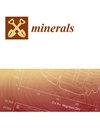Geochronology and Geochemical Characteristics of Granitoids in the Lesser Xing’an–Zhangguangcai Range: Petrogenesis and Implications for the Early Jurassic Tectonic Evolution of the Mudanjiang Ocean
IF 2.2
4区 地球科学
Q2 GEOCHEMISTRY & GEOPHYSICS
引用次数: 0
Abstract
This article focuses on zircon U-Pb isotope dating and a whole-rock elemental analysis of granodiorites, monzonitic granites, granodioritic porphyries, and alkali feldspar granites in the Yangmugang area of the Lesser Xing’an–Zhangguangcai Range. The zircon U-Pb isotope-dating results revealed that these granitic rocks formed during the late Early Jurassic period (182.9–177.2 Ma). Their geochemical characteristics and zircon saturation temperatures suggest that the granodiorites are moderately differentiated I-type granites and the monzonitic granite, granodioritic porphyries, and alkali feldspar granites are highly differentiated I-type granites. The degree of magma differentiation progressively increased from granodiorites to alkali feldspar granites. By combining the regional Nd and Hf isotope compositions, it was inferred that the magma source involved the melting of lower crustal material from the Mesoproterozoic to the Neoproterozoic eras. By integrating these findings with contemporaneous intrusive rock spatial variations, it was indicated that the late Early Jurassic granitoids in the Lesser Xing’an–Zhangguangcai Range formed within an extensional tectonic setting after the collision and closure of the Songnen–Zhangguangcai Range and Jiamusi blocks. Additionally, this study constrains the closure of the Mudanjiang Ocean to the late Early Jurassic period (177.2 Ma).小兴安岭-张广才岭花岗岩的地质年代和地球化学特征:岩石成因及其对牡丹江洋早侏罗世构造演化的影响
本文主要研究了小兴安岭-张广才岭杨木岗地区的锆石U-Pb同位素年代测定和花岗闪长岩、单斜花岗岩、花岗斑岩和碱长石花岗岩的全岩元素分析。锆石U-Pb同位素年代测定结果显示,这些花岗岩形成于早侏罗世晚期(182.9-177.2Ma)。它们的地球化学特征和锆石饱和温度表明,花岗闪长岩属于中度分异的I型花岗岩,而单斜花岗岩、花岗斑岩和碱性长石花岗岩属于高度分异的I型花岗岩。从花岗闪长岩到碱性长石花岗岩,岩浆分异程度逐渐增加。结合区域钕、铪同位素组成,推断岩浆来源涉及中新生代至新新生代的下地壳物质熔融。通过将这些发现与同期侵入岩空间变化相结合,表明小兴安岭-张广才岭晚侏罗世花岗岩是在松嫩-张广才岭与佳木斯地块碰撞和闭合后的扩展构造环境中形成的。此外,这项研究还将牡丹江洋的闭合时间限定在早侏罗世晚期(177.2 Ma)。
本文章由计算机程序翻译,如有差异,请以英文原文为准。
求助全文
约1分钟内获得全文
求助全文
来源期刊

Minerals
MINERALOGY-MINING & MINERAL PROCESSING
CiteScore
4.10
自引率
20.00%
发文量
1351
审稿时长
19.04 days
期刊介绍:
Minerals (ISSN 2075-163X) is an international open access journal that covers the broad field of mineralogy, economic mineral resources, mineral exploration, innovative mining techniques and advances in mineral processing. It publishes reviews, regular research papers and short notes. Our aim is to encourage scientists to publish their experimental and theoretical results in as much detail as possible. There is no restriction on the length of the papers. The full experimental details must be provided so that the results can be reproduced.
 求助内容:
求助内容: 应助结果提醒方式:
应助结果提醒方式:


